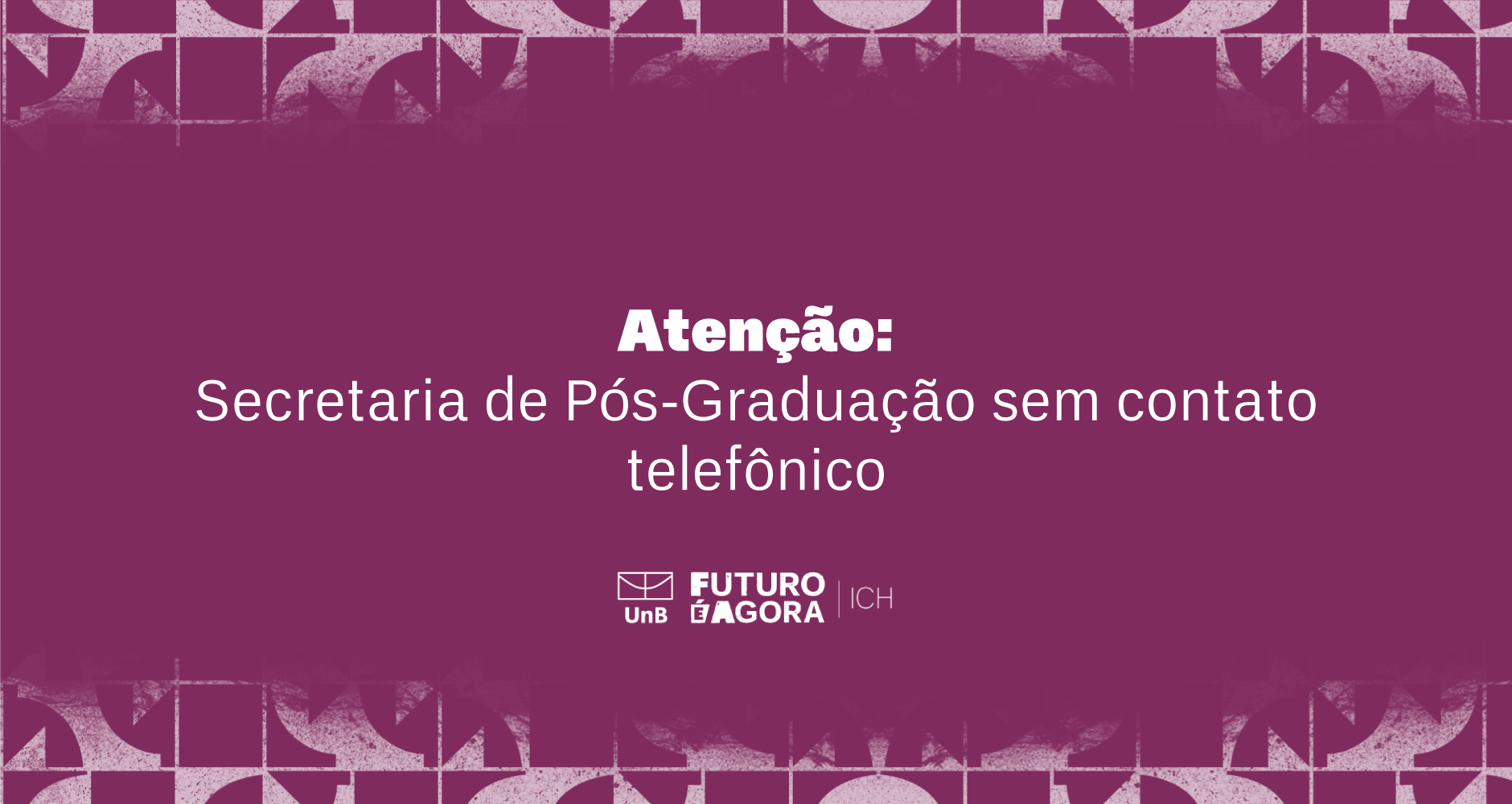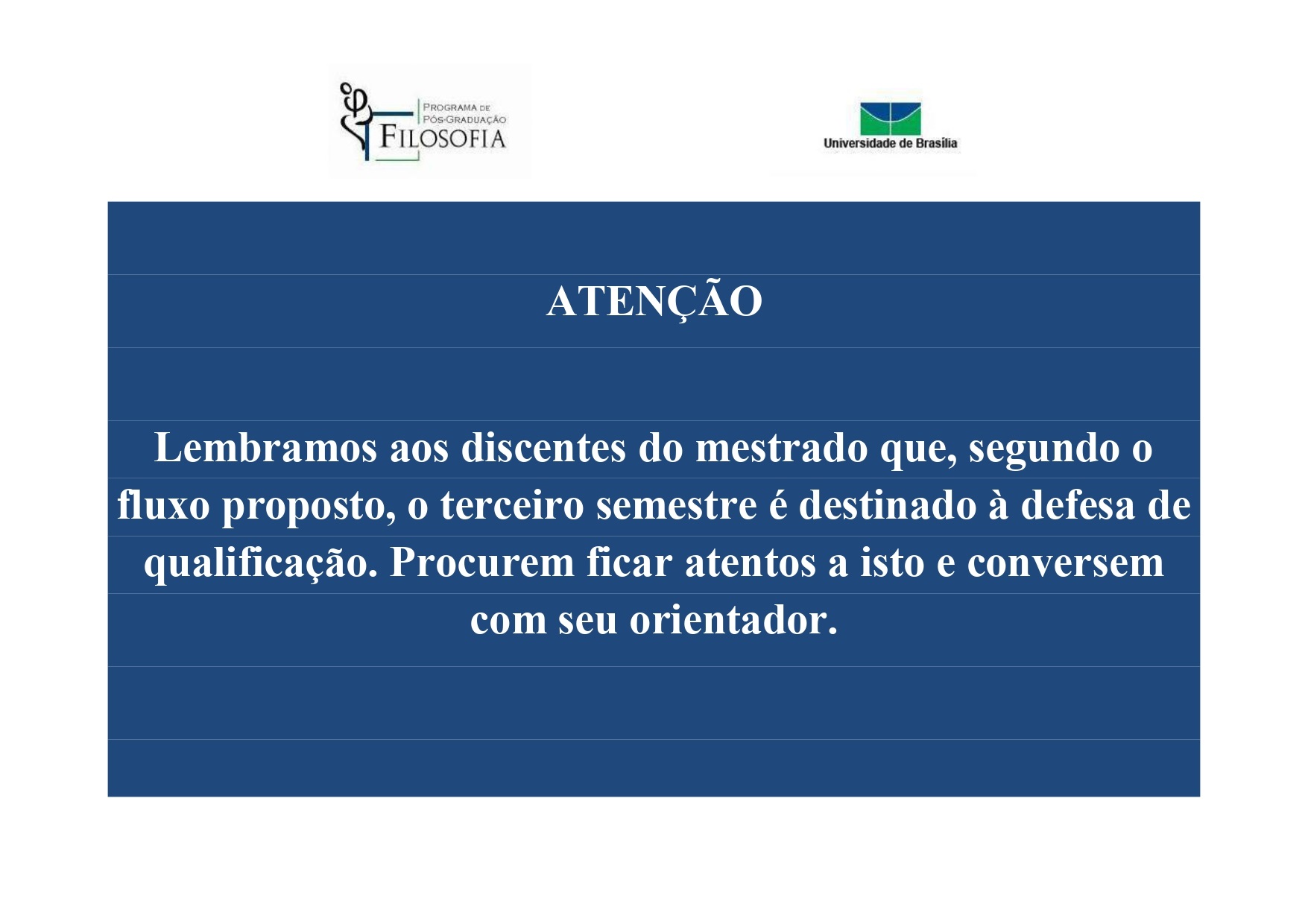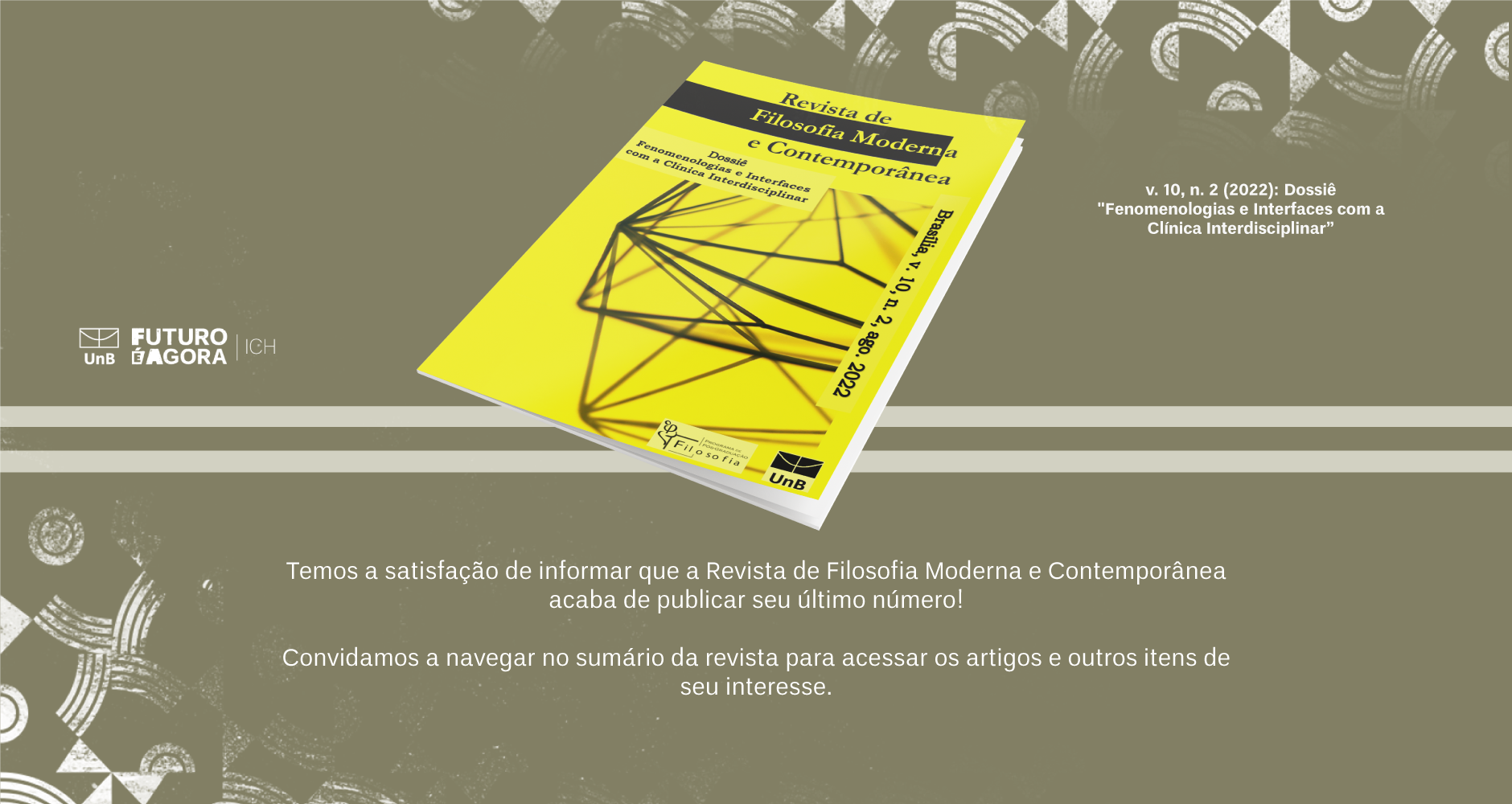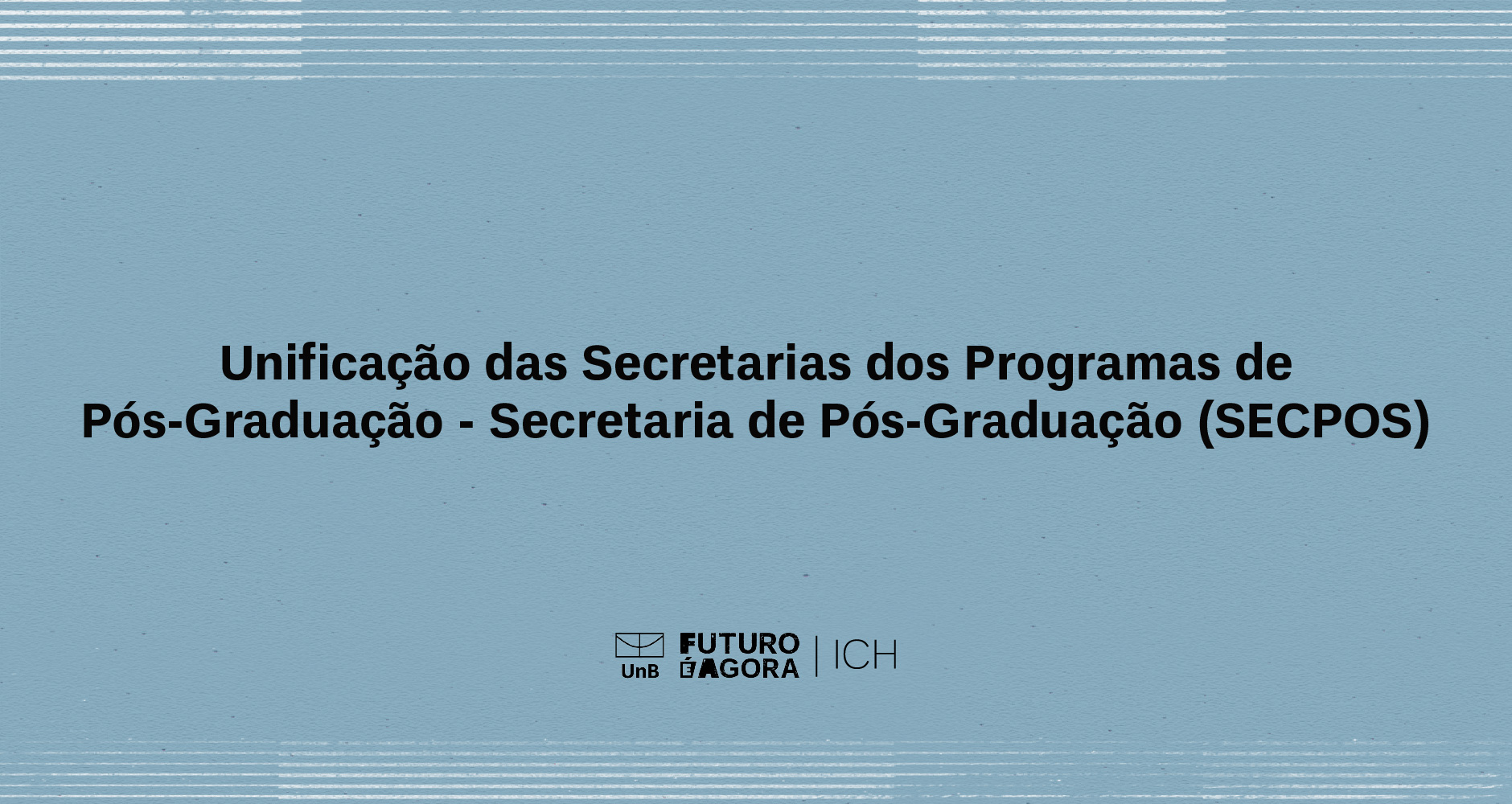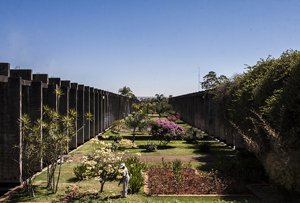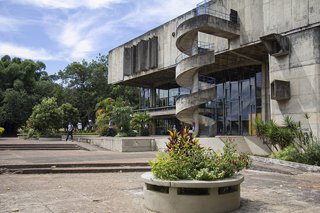UNIVERSIDADE DE BRASÍLIA
Instituto de Ciências Humanas
Programa de Pós-Graduação em Filosofia
Disciplina: Lógica Intensional (347078)
Primeiro Semestre de 2020
Prof. Dr. Nelson Gonçalves Gomes
1. OBJETIVO DO CURSO: Apresentar ao discente pós-graduando um
delineamento abrangente sobre linguagens intensionais, lógica modal e elementos
de lógica deôntica, com ênfase sobre questões filosóficas. Serão trabalhados a
sintaxe e a semântica de linguagens modais e deônticas, assim como os seus
principais cálculos, características e problemas.
2. MÉTODO: As aulas serão expositivas, com exercícios.
3. AVALIAÇÃO: Haverá duas verificações, cuja média aritmética será a menção
final.
4. PROGRAMA:
Lógica modal
4.1 Noções gerais sobre sistemas intensionais, em contraposição aos extensionais.
Noções históricas sobre lógica modal. A crítica de Quine à lógica modal. O
advento da semântica dos mundos possíveis.
4.2 A linguagem proposicional modal.
4.3 Os sistemas normais K, D, T e seus tableaux.
4.4 Os sistemas normais S4, B e S5 e seus tableaux.
4.5 Sistemas não-normais. Os sistemas fracos S0.5, S2, S3, E e S.
4.6 A linguagem da lógica modal de predicados. Tableaux.
4.7 A fórmula de Barcan. De dicto e de re. Identidade modal.
4.8 Necessidade lógica e necessidade metafísica. A retomada da metafísica na
filosofia analítica.
4.9 O argumento ontológico de Gödel.
Lógica deôntica
4.10 O sistema deôntico padrão. A semântica dos mundos deonticamente perfeitos.
4.11 Paradoxos deônticos.
4.12 A relação ser-dever.
4. 13 Lógica da ação; lógica revogável.
5. BIBLIOGRAFIA
Textos de lógica modal ou de questões filosóficas com ela relacionadas
ANDERSON, A. “General intensional logic”. In GABBAY, D. & GUENTHENER,
F. (eds.), pp. 355-386.
ANDERSON, A. & BELNALP, N. Entailment: The logic of relevance and necessity.
Princeton: Princeton University Press, vol. 1: 1975, vol. 2: 1992.
ARRUDA, José Maria. Mundos possíveis: realismo modal extremo e atualismo. In
IMAGUIRE, Guido & ALMEIDA, Custódio & OLIVEIRA, Manfredo (orgs.).
Metafísica contemporânea, pp. 351-75.
2
BARCAN MARCUS, R. Modalities: Philosophical essays. New York/Oxford:
Oxford University Press, 1993.
BEALER, G. Quality and concept. Oxford: Clarendon Press, 1982.
BEYER, Chr. & BURRI, Alex (eds.). Philosophical Knowledge - Its Possibility and
Scope. Amsterdam-New York: Rodopi, 2007.
BLACKBURN, P. & de RIJKE, Maarten & VENEMA, Yde. Modal logic.
Cambridge: Cambridge University Press, 2001.
BLACKBURN, P. & WOLTER, F. & van BENTHEM, F.A.K. (eds.) Handbook of
modal logic. Amsterdam: Elsevier, 2006.
BOOLOS, G. The logic of provability. New York: Cambridge University Press, 1993.
BRADLEY, R. & SWARTZ, N. Possible worlds: An introduction to logic and its
philosophy. Oxford: Basil Blackwell, 1979.
BRANQUINHO, J. & MURCHO, D. & GOMES, N. G. (eds). Enciclopédia de termos
lógico-filosóficos. São Paulo: Editora Martins Fontes, 2006.
BRENNAN, A. et al. “Is necessity really necessary?”. In: L. Goldstein (ed.). Logic:
Key concepts in philosophy. London/New York: Continuum, 2005, pp. 115-34.
Tradução brasileira de Lia Levy: “A necessidade é realmente necessária?” In L.
Goldstein (ed.): Lógica: Conceitos-chave em filosofia.. Porto Alegre: Artmed,
2007, pp. 135-57.
BROCK, S. & MARES, E. Realism and Anti-Realism. Montreal & Kingston/Ithaca:
McGill-Queen’s University Press, 2007.
BULL, R. & SEGERBERG, K. “Basic modal logic”. In: D. GABBAY, D. &
GUENTHENER, F. (eds.), pp. 1-88.
BURGESS, John P. Mathematics, Models and Modality. Selected Philosophical
Essays. Cambridge: Cambridge University Press, 2008.
BURKHARDT, Hans. De Orígenes a Kripke: a história dos mundos possíveis. In
IMAGUIRE, Guido & ALMEIDA, Custódio & OLIVEIRA, Manfredo (orgs.).
Metafísica contemporânea, pp. 335-50.
CARNAP, R. Meaning and necessity: A study in semantics and modal logic. 2a ed.
Chicago and London: The University of Chicago Press, 1956 (1947).
CARNIELLI, Walter & PIZZI, Claudio. Modalities and Multimodalities. Berlin:
Springer, 2009.
CHELLAS, B. Modal logic: An introduction. Cambridge: Cambridge University
Press, 1980.
3
CHIHARA, Charles S. The worlds of possibility: Modal realism and the semantics of
modal logic. Oxford: Clarendon Press, 1998.
CHRISTIAS, Dionysis. The resurgence of metaphysics in late analytic philosophy: A
constructive critique. In philinq VI 1, 2018, pp. 123-148.
COCCHIARELLA, Nino B. & FREUND, Max A. Modal logic: An introduction to
its syntax and semantics. Oxford: Oxford University Press, 2008.
CRESSWELL, M. J. “Modal logic”. In GOBLE, L. (ed.), pp. 136-158.
DIVERS, J. Possible worlds. London / New York: Routledge, 2002.
ELSTER, Jon. Logic and society – Contradictions and possible worlds.
Chichester/New York: John Wiley and Sons, 1978.
FINE, Kit. “The Problem of De Re Modality”. J. Almog & J. Perry & H. Wettstein
(eds.): Themes from Kaplan. New York: Oxford University Press, 1989, pp. 197-
272.
FINE, Kit. Modality and tense. New York: Oxford University Press, 2005.
FITTING, M. Types, tableaux, and Gödel’s God. Boston: Kluwer, 2002.
FITTING, M. & MENDELSOHN, R. First order modal logic. Dordrecht: Kluwer
Academic Publishers, 1998.
FORBES, G. The metaphysics of modality. Oxford: Clarendon Press, 1985.
FORBES, G. Modern logic: a text in elementary symbolic logic. New York/Oxford:
Oxford University Press, 1994.
FORBES, G. “Substitutivity and the coherence of quantifying in”. In JACQUETTE,
D. (ed.), 2002, pp. 338-355.
FØLLESDAL, D. “Interpretation of quantifiers”. In JACQUETTE, D. (ed.), 2002, pp.
301-307.
FØLLESDAL, D. Referential Opacity and Modal Logic. New York & London:
Routledge, 2004.
GABBAY, D. & GUENTHNER, F. (eds.). Handbook of philosophical logic, vol. II:
Extensions of classical logic. Dordrecht: D. Reidel Publishing Company, 1984.
GABBAY, D. et alii (eds.). Handbook of Deontic Logic and Normative Systems.
London: College Publications, 2013.
GAMUT, L.T.F. Logic, language and meaning: vol. 1: Introduction to logic, vol. 2:
Intensional logic and logical grammar. Chicago and London: The University of
Chicago Press, 1991.
GARSON, J. Modal logic for philosophers. Cambridge: Cambridge University Press,
2006.
4
GEACH, P. T. Logic matters. Oxford: Basil Blackwell, 1981 (1972).
GENSLER, H.J. Symbolic logic: Classical & advanced systems. Englewood Cliffs
(New Jersey): Prentice Hall, 1990.
GIRLE, R. Modal logics and philosophy. Montreal: McGill University Press, 2000.
GIRLE, R. Possible Worlds. Chesham: Acumen Publishing Limited, 2003.
GOBLE, L. (ed.). The Blackwell guide to philosophical logic. Oxford: Blackwell
Publishers, 2001.
GÖDEL, K. Ontological Proof. In Collected Works, vol. III, S. Feferman & S. C.
Kleene (eds.). New York: Oxford University Press, 1995, pp. 403-4 e p. 476.
GOMES, N. G. Summum Bonum. In Analytica, vol. 10, no 1, 2006.
HAACK, S. Philosophy of logics. Cambridge: Cambridge University Press, 1985
(1978). Tradução brasileira de C. Mortari e de L. H. Dutra: Filosofia das lógicas.
São Paulo: Ed. UNESP, 2002.
HAHN, L.E. & SCHILPP, P.A. (eds.). The philosophy of W.V. Quine. (The library of
living philosophers, expanded edition). Chicago and La Salle (Illinois): Open
Court, 1998 (1986).
HALE, Bob & HOFFMANN, Aviv (eds.). Modality – Metaphysics, Logic and
Epistemology. Oxford: Oxford University Press, 2010.
HUGHES, Chr. Kripke – Names, necessity and identity. Oxford: Clarendon Press,
2004.
HUGHES, G. & CRESSWELL, M. An introduction to modal logic. London:
Methuen, 1968. Tradução para o espanhol de E. Guisan Sejas: Introducción a la
lógica modal. Madrid: Editorial Tecnos, 1973.
HUGHES, G. & CRESSWELL, M. A companion to modal logic. London: Methuen,
1984.
HUGHES, G. & CRESSWELL, M. A new introduction to modal logic. London:
Routledge, 1996.
HUMBERSTONE, Lloyd. Philosophical Applications of Modal Logic. London:
College Publication, King’s College, 2015.
HUMPHREYS, P. & FETZER, J. (eds.) The new theory of reference: Kripke, Marcus
and other origins. Dordrecht; Kluwer Academic Publishers, 1998.
IMAGUIRE, Guido & ALMEIDA, Custódio & OLIVEIRA, Manfredo (orgs.).
Metafísica contemporânea. Petrópolis: Editora Vozes, 2007.
5
IMAGUIRE, Guido & SCHIRN, Matthias. Estudos em filosofia da linguagem. São
Paulo: Edições Loyola, 2008. (O capítulo 1 versa sobre nomes próprios e
descrições.)
JACQUETTE, Dale. Logic-And How It Gets That Way. Durham: Acumen Publishing
Limited, 2010.
JACQUETTE, Dale. (ed.). Philosophy of logic: An anthology. Oxford: Blackwell
Publishers, 2002.
JANSANA, R. Una introducción a la lógica modal. Madrid: Tecnos, 1990.
JUBIEN, Michael. Possibility. Oxford: Clarendon Press, 2009.
JUBIEN, Michael. ‘The intensionality of ontological commitment”. In JACQUETTE,
D. (ed.), 2002, pp. 356-361.
KAPLAN, D. “Quantifying in”. In JACQUETTE, D. (ed.), 2002, pp. 318-337.
KIM, J. & SOSA, E. (eds.). Metaphysics: An anthology. Oxford: Blackwell, 1999.
KONYNDIK, K. Introductory modal logic. Notre Dame: University of Notre Dame
Press, 1986.
KRACHT, M. Tools and techniques in modal logic. Amsterdam: North-Holland,
1999.
KRIPKE, S. Naming and necessity. Oxford: Basil Blackwell, 1980 (1972). Tradução
lusitana de Ricardo Santos: O nomear e a necessidade. Lisboa: Gradiva, 2013.
KRIPKE, S. “Identity and necessity”. In LOUX, M.J. (ed., 2001), pp. 218-247.
LECLERC, André. O essencialismo desde Kripke. In IMAGUIRE, Guido &
ALMEIDA, Custódio & OLIVEIRA, Manfredo (orgs.). Metafísica
contemporânea, 376-399.
LEMMON, E. & SCOTT, D. An introduction to modal logic. Oxford: Blackwell,
1977.
LEWIS, C.I. & LANGFORD, C.H. Symbolic logic. New York: Dover Publications,
1959 (1932).
LEWIS, D. Counterfactuals. Oxford: Basil Blackwell, 1974.
LEWIS, D. On the plurality of worlds. Oxford: Basil Blackwell, 1986.
LEWIS, D. Papers in philosophical logic. Cambridge: Cambridge University Press,
1998.
LEWIS, D. “Counterpart theory and quantified modal logic”. In JACQUETTE, D.
(ed.), 2002, pp. 292-300.
LEWIS, D. “Possible worlds”. In LOUX, M. J. (ed.), 2001, pp. 160-167.
6
LEWIS, D. “Counterparts or double lives?”. In LOUX, M. J. (ed.), 2001, pp. 188-
217.
LINDSTRÖM, S. & SEGERBERG, K. “Modal logic and philosophy”. In
BLACKBURN, P. & WOLTER, F. & van BENTHEM, F.A.K. (eds.) Handbook
of modal logic. Amsterdam: Elsevier, 2006, pp. 1149-1214.
LINSKY, L. (ed.). Reference and modality. Oxford University Press, 1977 (1971).
LOUX, M. J. (ed.). The possible and the actual: Readings in the metaphysics of
modality. Ithaca and London: Cornell University Press, 1979.
LOUX, M. J. Metaphysics: A contemporary introduction. London/New York:
Routledge, 1998, 2a ed. 2002, 4a reimpressão da 2a ed. 2005.
LOUX, M. J. (ed.). Metaphysics: contemporary readings. London/New York:
Routledge, 2001.
LOUX, M. J. & ZIMERMAN, Dean (eds.). The Oxford handbook of metaphysics.
New York: Oxford University Press, 2005.
MARCUS, R. BARCAN. “A backward look at Quine’s animadversions on
modalities”. In JACQUETTE, D. (ed.), pp. 308-319.
MARCUS, R. BARCAN. Modalities: Philosophical essays. New York/Oxford:
Oxford University Press, 1993.
MARES, Edwin. A Priori. Montreal & Kingston/Ithaca: McGill-Queen’s University
Press: 2011.
McGINN, C. Logical properties: Identity, existence, predication, necessity, truth.
Oxford: Clarendon Press, 2000.
McLEOD, Stephen K. Knowledge of Necessity: Logical Positivism and Kripkean
Essentialism. In Philosophy 83 (2008): 179-191.
McLEOD, Stephen K. How to reconcile essence with contingent existence. In Ratio
(new series), XXI 3 September 2008, pp. 314-28.
McLEOD, Stephen K. Modaliy and Anti-Metaphysics. New York and London:
Routledge, 2018 (2001).
MERLUSSI, Pedro. O argumento ontológico e o problema da possibilidade da
existência de Deus. In Crítica na Rede, 12 de julho de 2009.
MOSER, P. K. (ed.). A priori knowledge. Oxford: Oxford University Press, 1987.
MURCHO, D. Essencialismo naturalizado. Aspectos da metafísica da modalidade.
Coimbra: Angelus Novus, 2002.
MURCHO, D. “Necessidade e anti-realismo”. In Pensar outra vez: Filosofia, valor e
verdade. Vila Nova de Famalicão: Edições Quasi, 2006, pp. 93-111.
7
NOLT, J.E. “What are possible worlds”. In JACQUETTE, D. (ed.), 2002, pp. 275-
284.
PLANTINGA, A. The nature of necessity. Oxford: Clarendon Press, 1982 (1974).
PLANTINGA, A. “Actualism and possible worlds”. In LOUX, M.J. (ed. 2001), pp.
168-187.
PLANTINGA, A. Essays in the Metaphysics of Modality. Edição de Matthew
Davidson. Oxford: Oxford University Press, 2003.
POPKORN, S. First steps in modal logic. Cambridge: Cambridge University Press,
1994.
PORTNER, Paul. Modality. Oxford: Oxford University Press, 2009.
PRIEST, G. An introduction to non-classical logic: From If to Is. Cambridge:
Cambridge University Press, 2008. (Este livro é a segunda edição de uma obra
publicada pelo autor em 2001: An introduction to non-classical logic. Porém, as
diferenças entre essas edições são amplas o bastante para que o texto de 2008 seja
considerado como um novo livro, muito superior ao primeiro.)
PRIOR, A.N. Time and modality. Oxford: Clarendon Press, 1957.
QUINE, W.V. Two dogmas of empiricism. In Philosophical Review, 60 (1951): 20-
43. Texto reimpresso por várias vezes, em especial em QUINE, W. V. From a
Logical Point of view-Nine Logico-Philosophical Essays, pp. 20-46. Tradução
brasileira de Marcelo Guimarães da Silva Lima: Dois dogmas do empirismo, In
Coleção Os Pensadores, vol. LII, São Paulo: Abril Cultural, 1975, pp. 237-254.
QUINE, W.V. From a Logical Point of view - Nine Logico-Philosophical Essays. 2a
edição, 11a impressão. Cambridge (Massachusetts)/London (England): Harvard
University Press, 1996 (1953). Tradução brasileira de Antônio Ianni Segatto: De
um ponto de vista lógico. São Paulo: Editora Unesp, 2011.
QUINE, W.V. The ways of paradox and other essays. Cambridge
(Massachusetts)/London (England): Harvard University Press, 1976 (1966).
QUINE, W.V. Philosophy of logic. Englewood: Prentice Hall, 1970.
Tradução brasileira de T. A. Cannabrava: Filosofia da lógica. Rio de Janeiro:
Zahar, 1972.
QUINE, W.V. “Quantifiers and propositional attitudes”. In JACQUETTE, D. (ed.),
2002, pp. 285-291.
READ, S. Thinking about logic: An introduction to the philosophy of logic.
Oxford/New York: Oxford University Press, 1995.
SALMON, N. Reference and essence. Oxford: Basil Blackwell, 1982, 2a ed. 2005.
SIDER, Theodore. Logic for Philosophy. Oxford: Oxford University Press, 2010.
8
SOAMES, Scott. Analiticidade, necessidade e conhecimento a priori. In Crítica na
Rede, 03 de agosto de 2019, tradução de Desidério Murcho.
STALNAKER, R. Ways a world might be: Metaphysical and anti-metaphysical
essays. Oxford: Clarendon Press, 2003.
STALNAKER, Robert. Mere Possibilities: metaphysical foundations of modal
semantics. Princeton (USA) e Oxford (UK): Princeton University Press, 2012.
SINNOT-ARMSTRONG, W. (ed.). Modality, morality, and belief: Essays in
honour of Ruth Barcan Marcus. New York: Cambridge University Press, 1995.
SMILEY, T. (ed.). Philosophical logic. Oxford: Oxford University Press, 1998.
TAYLOR, K. Truth & meaning: An introduction to the philosophy of language.
Oxford: Blackwell Publishers, 1998.
VAN BENTHEM, Johan. Modal logic for open minds. Stanford (California): CSLI
Publications, 2010.
VAN BENTHEM, Johan. A manual of intensional logic. Stanford: CSLI, 1988.
VAN INWAGEN, P. Ontology, identity and modality. Cambridge: Cambridge
University Press, 2001.
VON WRIGHT, G.H. An essay in modal logic. Amsterdam: North Holland, 1951.
Tradução para o espanhol de A. A. Demarchi: Ensayo de lógica modal. Buenos
Aires: Santiago Rueda, 1970.
VON WRIGHT, G.H. Philosophical papers, vol. III: Truth, knowledge and modality.
Oxford: Basil Blackwell, 1984.
VUILLEMIN. J. Necessity or contingency: The master argument. Stanford: CSLI
Publications, 1996.
WARMKE, Craig. Modal Semantics without Worlds. In Philosophy Compass 11
(11), 2016, pp. 702-15.
WHITE, A. R. Modal thinking. Ithaca, New York: Cornell University Press, 1975.
WILLIAMSOM, Timothy. Philosophical Knowledge and Knowledge of
Counterfactuals. In BEYER, Chr. & BURRI, Alex (eds.). Philosophical
Knowledge - Its Possibility and Scope, pp. 89-123.
WILLIAMSON, Timothy. The philosophy of philosophy. Oxford: Blackwell, 2008.
WILLIAMSON, Timothy. Modal Logic as Metaphysics. Oxford: Oxford University
Press, 2013.
ZEMAN, J. Modal logic, the Lewis-modal systems. Oxford: Oxford University Press,
1973.
9
Textos de lógica deôntica ou de questões filosóficas com ela relacionadas
AL HIBRI, A. Deontic Logic: A Comprehensive Appraisal and a New Proposal.
Washington: University Press of America, 1978.
ALCHOURRÓN, C. E. & BULYGIN, E. Normative Systems. Wien/New York: Springer,
1971.
ANTONELLI, G. A. Grounded Consequence for Defeasible Logic. New York:
Cambridge University Press, 2005.
ÅQVIST, L. Deontic Logic. GABBAY, D. & GUENTHNER, F. (eds.), pp. 605-714.
ÅQVIST, L. Introduction to the Deontic Logic and to the Theory of Normative Systems.
Napoli: Bibliopolis, 1987.
CARMO, J. Lógica deôntica. João Branquinho & Desidério Murcho & Nelson G. Gomes
(eds.). Enciclopédia de termos lógico-filosóficos. São Paulo: Martins Fontes, 2006, pp.
447-50.
CASTAÑEDA, H.-N. Thinking and Doing: The Philosophical Foundations of
Institutions. Dordrecht: D. Reidel Publishing Company, 1975.
CASTAÑEDA, H.-N. The Twofold Structure and the Unity of Practical Thinking. A.
CONTE et al. (eds.): Deontische Logik und Semantik. Wiesbaden: Athenaion, 1977.
CASTAÑEDA, H.-N. The Paradoxes of Deontic Logic : The Simplest Solution to All of
Them in One Fell Swoop. R. HILPINEN (ed.), 1981, pp. 37-86.
CHARLOW, Nate & CHRISMAN, Matthew (eds.). Deontic Modality. Oxford: Oxford
University Press, 2016.
CHISHOLM, R. M. Contrary to Duty Imperatives and Deontic Logic. Analysis, 24
(1963): 33-36.
De GREEF, J. Lógica Deôntica. M. Canto-Sperber (org.): Dicionário de Ética e Filosofia
Moral, vol. 1. Tradução de Ana Maria Ribeiro-Althoff et al. São Leopoldo: Editora
UNISINOS, 2003. Versão original: Dictionaire d’Éthique et de Philosophie Morale.
Parios: PUF.
FEHIGE, Ch. & WESSELS, U.(ed.). Preferences. Berlin/New York: Walter de Gruyter,
1998.
FELDMAN, Fr. Doing the Best We Can: An Essay in Informal Deontic Logic.
Dordrecht: D. Reidel Publishing Company, 1986.
FORRESTER, J. Wm. Being Good & Being Logical: Philosophical Groundwork for a
New Deontic Logic. Armonk (N.Y.)/London (England): M.E. Sharpe, 1996.
10
FØLLESDAL, D. & HILPINEN, R. Deontic Logic: An Introduction. R. Hilpinen (ed.),
1971, pp. 1-38.
GABBAY, D. & GUENTHNER, F. (eds.). Handbook of Philosophical Logic, vol. II:
Extensions of Classical Logic. Dordrecht: D. Reidel Publishing Company, 1984.
GEACH, Peter (ed.). Logic and Ethics. Dordrecht/Boston/London: Kluwer Academic
Publishers, 1991.
GOBLE, L. (ed.). The Blackwell Guide to Philosophical Logic. Oxford: Blackwell
Publishers, 2001.
GOLDBLATT, R. Logics of Time and Computation. Stanford: CSLI, 1987.
GOMES, N. G. Um panorama da lógica deôntica. Kriterion 49 (2008): 9-38.
HANSON, B. An Analysis of Some Deontic Logics. R. HILPINEN (ed), 1971[1970] ,pp.
121-147.
HARE, R. M. The Language of Morals. Oxford: Clarendon Press, 1952, repr. 1986.
Tradução brasileira de Eduardo Pereira e Ferreira: A linguagem da moral. Martins
Fontes, 1996.
HILPINEN, R. (ed.). Deontic Logic: Introductory and Systematic Readings. Dordrecht:
D. Reidel Publishing Company, 1971.
HILPINEN, R. (ed.). New Studies in Deontic Logic: Norms , Actions and the Foundations
of Ethics. Dordrecht: D. Reidel Publishing Company, 1981.
HILPINEN, R. Deontic Logic. L. GOBLE (ed.): The Blackwell Guide to Philosophical
Logic. Oxford: Blackwell, 2001, pp. 159-182.
HILPINEN, R. Deontic, Epistemic and Temporal Modal Logics. Dale Jacquette (ed.),
[2002] 2006, pp. 491-510.
HINTIKKA, J. Quantifiers in Deontic Logic, Societas Scientiarum Fennica
Commentationes Humanarum Litterarum, 23: 4, Helsinki, 1957.
HINTIKKA, J. Deontic Logic and its Philosophical Morals. J. HINTIKKA: Models for
Modalities. Selected Essays. Dordrecht: D. Reidel Publishing Company, 1970, pp.
184-214.
HOROVITZ, J. Law and Logic: A Critical Account of Legal Argument. Wien/New
York: Springer, 1972.
HORTY, J. Nonmonotonic Foundation for Deontic Logic. D. NUTE (ed.), 1997, pp. 17-
44.
HORTY, J. Agency and Deontic Logic. New York: Oxford University Press, 2001.
11
HUME, David. A Treatise of Human Nature. Oxford: Oxford University Press, 1978
(1739-40). Tradução brasileira de Débora Danowski: Tratado da Natureza Humana,
2a edição. São Paulo: Unesp, 2009.
JACQUETTE, Dale. (ed.). Philosophy of Logic: An Anthology. Oxford: Blackwell
Publishers, 2002.
JACQUETTE, Dale. (ed.). A Companion to Philosophical Logic. Oxford: Blackwell,
[2002] 2006.
JONES, A.J.I. & SERGOT, M.J. “On the Characterisation of Law and Computer
Systems: The Normative Systems Perspective”. In MEYER, J.J. & WIERINGA,
R.J. (orgs.), pp. 275-307.
JØRGENSEN, J. Imperatives and Logic. Erkenntnis, 7 (1937-1938): 288-296.
KALINOWSKI, G. La Logique des Normes. Paris: PUF, 1972. Tradução espanhola de
Juan Ramon Capella: Lógica del Discurso Normativo. Madrid: Tecnos, 1975.
KANGER, S. New Foundations for Ethical Theory. R. HILPINEN (ed.), 1971, pp. 36-
58.
KANGER, S. & KANGER, L. Rights and Parliamentarism. Theoria, 32, (1966): 85-115.
KANT, I. Grundlegung zur Metaphysik der Sitten. Kants Werke, IV, Akademie
Textausgabe. Berlin: Walter de Gruyter, 1968 [1785], pp. 385-463.
KNUUTTILA, S. The Emergency of Deontic Logic in the Fourteenth Century. Hilpinen,
R. (ed.), 1981, pp. 225-248.
KOONS, R.C. & SEUNG, T.K. Defeasible Reasoning and Moral Dilemmas. D. NUTE
(ed.), 1997, pp. 205-222.
KRIPKE, S. Semantical Analysis of Modal Logic I: Normal Modal Propositional Calculi.
Zeitschrift für mathematische Logik, 9 (1963): 67-96.
KRIPKE, S. Semantical Considerations on Modal Logic. Proceedings of a Colloquium
on Modal and Many-Valued Logics, Acta Philosophica Fennica, 16 (1963): 83-94.
LAUENER, H. Ethik des Methodologischen Humanismus: Kritische Bemerkungen zur
Relativität von Normen und zum Pluralismus von Systemen der Moral. Erkenntnis,
54, no 1 (2001): 77-103.
LEIBNIZ, G.W. Elementa iuris naturalis. G.W. LEIBNIZ: Sämtliche Schriften und
Briefe, Sechste Reihe: Philosophische Schriften, Bd. 1. Darmstadt: Otto Reichel
Verlag, 1930, pp. 431-485.
12
LINDAHL, L. Position and Change: A Study in Law and Logic. Dordrecht: D. Reidel
Publishing Company, 1977.
LINDSTRÖM, S. & SEGERBERG, K. 2007. Modal Logic and Philosophy. P.
BLACKBURN & J. van BENTHEM & F. WOLTER (eds.). Handbook of Modal
Logic. Amsterdam: Elsevier, 2007, pp. 1149-1214.
MAKINSON, David. Individual Actions are Very Seldom Obligatory. The Journal of
Non-Classical Logic. II/I (1983): 7-13.
MAKINSON, David. On a Fundamental Problem of Deontic Logic. In McNAMARA,
P. & PRAKKEN, (eds.), pp. 29-54.
MALLY, E. Grundgesetze des Sollens. Elemente der Logik des Willens. Graz: Leuchner
& Lubensky, 1926.
MARCISZEWSKI, W. (ed.). Dictionary of Logic as Applied in the Study of Language:
Concepts, Methods, Theories. The Hague/Boston/London: Martinus Nijhoff
Publishers, 1981.
McNAMARA, P. & PRAKKEN, (eds.). Norms, Logics and Information Systems.
Amsterdam: IOS Press, 1999.
MEYER, J.J. & WIERINGA, R.J. (orgs.). Deontic Logic in Computer Science:
Normative Systems Specification. New York: John Wiley and Sons, 1993.
NUTE, D. (ed.). Defeasible Deontic Logic. Dordrecht/Boston/London: Kluwer Academic
Publishers, 1997.
NUTE, D. Apparent Obligation. In D. NUTE (ed.), Defeasible Deontic Logic, pp. 287-
316.
NUTE, D. & XIAOCHANG, Y. Introduction. In D. NUTE (ed.), Defeasible Deontic
Logic,, pp. 1-16.
PAIVA CRUZ, Ângela Maria. Lógica deôntica paraconsistente: Paradoxos e dilemas.
Natal: Editora da UFRN, 2005.
PRIOR, A. Formal Logic, 2a edição. Oxford: Oxford University Press, 1962.
QUINN, Philip. Divine Commands and Moral Requirements. Oxford: Clarendon Press,
1978.
RESCHER, N. (ed.). The Logic of Decision and Action. Pittsburgh: University of
Pittsburgh Press, 1967.
13
RIJKE, M. Advances in Intensional Logic. Dordrecht: Kluwer, 1997.
RÖNNEDAL, Daniel. An Introduction to Deontic Logic. Lexington (KY), 2011. (Sem
indicação de editora).
ROSS, A. Directives and norms. London: Routledge and Kegan Paul, 1968. Tradução
espanhola de José S. P. Hierro: Lógica de las normas. Madrid: Tecnos, 1971.
ROSS, A. Imperatives and Logic. Theoria, 7 (1941): 53-71.
ROYAKKERS, Lambèr M. M. Extending Deontic Logic for the Formalisation of Legal
Rules. Dordrecht/Boston/London: Kluwer Academic Publishers, 2010.
SCHURZ, Gehard. The Is-Ought Problem: An Investigation in Philosophical Logic.
Dordrecht: Kluwer, 1997.
THOMSOM, J. J. Normativity. Chicago and La Salle (Illinois): Open Court, 2010
[2008].
TOMÁS de AQUINO. Suma Teológica, 11 volumes. Tradução de Alexandre Corrêa.
Porto Alegre: EST/SULINA/UCS, 1980.
TOMBERLIN, J.E. Good Samaritans and Castañeda’s System of Deontic Logic.
TOMBERLIN, J.E. (ed.): Hector-Neri Castañeda. Dordrecht: D. Reidel Publishing
Company, 1986, pp. 255-272.
WEINGARTNER, P. Applications of Logic outside Logic and Mathematics: Do Such
Applications Force us to Deviate from Classical Logic?. W. STELZNER & M.
STÖCKLER (eds.): Zwischen traditioneller und moderner Logik: Nichtklassische
Ansätze. Padeborn: Mentis, 2001, pp. 53-64.
VON KUTSCHERA, Fr. Grundlagen der Ethik, 1a edição. Berlin/New York: Walter de
Gruyter, [1982] 1999. Tradução espanhola de Maria Teresa Hernán Pérez:
Fundamentos de ética. Madrid: Cátedra, 1989
VON WRIGHT, G.H. 1951. Deontic Logic. Mind, 60 (1951): 1-5.
VON WRIGHT, G.H. A Note on Deontic Logic and Derived Obligations. Mind, 65
(1956): 507-509.
VON WRIGHT, G.H. A New System of Deontic Logic. Danish Yearbook of Philosophy,
I (1964): 173-182.
VON WRIGHT, G.H. A Correction to a New System of Deontic Logic. Danish Year
Book of Philosophy, 2 (1965): 103-107.
14
VON WRIGHT, G.H. On the Logic and Ontology of Norms. J.W. Davis et al. (eds.):
Philosophical Logic. Dordrecht: D. Reidel Publishing Company, 1969, pp. 89-107.
VON WRIGHT, G.H. A New System of Deontic Logic. R. Hilpinen (ed.), 1971, pp. 105-
120. (Este artigo é uma reimpressão parcial de von Wright 1964, com outros adendos.)
WEDGWOOD, Ralph. The Meaning of ‘Ought’. Russ Shafer-Landau (ed.): Oxford
Studies in Metaethics, vol. I. Oxford: Clarendon Press, 2006, pp. 127-60.
WIERINGA, R.J. & MEYER, J.J. Applications of Deontic Logic in Computer Sciences:
A Concise Overview. MEYER, J.J. & WIERINGA, R.J. (orgs.), pp. 17-40.
WILLIAMS, B. Ethical Consistency. B. WILLIAMS: Problems of the Self. Cambridge:
Cambridge University Press, 1973, pp. 166-186.
WOOLDRIGE, M. & RAO, A. Foundations of Rational Agency. Dordrecht: Kluwer,
1999.
ZIEMBA, Z.. Deontic Logic. MARCISZEWSKI, W. (ed.), 1981, pp. 97-104.
CRONOGRAMA
Datas Aulas
CONTEÚDO
13.III. 1a Noções sobre linguagens intensionais.
20.III. 2a A linguagem proposicional modal: sintaxe e semântica.
27.III. 3a Os sistemas normais K, D, T.
03.IV. 4a Os sistemas normais S4, B e S5.
17.IV. 5a Os sistemas fracos S0.5, S2, S3, E e S.
24.IV. 6a A linguagem modal de predicados. Tableaux.
08.V. 7a A fórmula de Barcan. De dicto e de re. Identidade.
15.V. 8a Necessidade lógica e necessidade metafísica.
22.V. 9a O argumento ontológico de Gödel.
29.V. 10a 1a verificação.
05.VI 11a O sistema deôntico padrão.
12.VI. 12a Paradoxos deônticos.
19.VI. 13a A relação ser-dever.
26.VI. 14a Lógica da ação; lógica revogável.
03.VII. 15a 2ª verificação.
Notas: (1) Cada aula corresponde a dois encontros. (2) Este cronograma está sujeito a
revisões. (3) Contactos com o professor podem ser feitos por meio do seguinte email:
Este endereço de email está sendo protegido de spambots. Você precisa do JavaScript ativado para vê-lo.


